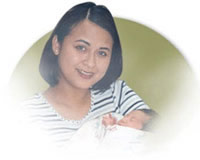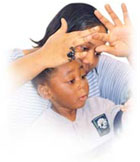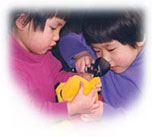
Newborn Hearing Screening
Universal Newborn Hearing Screening
Program Summary
As
many as 30 babies are born in Alaska every year with hearing
loss. That is why it is important to screen all newborn babies
before they leave the hospital. If your baby can’t hear
well, he/she may have problems learning to talk. If you find
a hearing loss early, your child will have the best chance to
learn.
 Universal
newborn hearing screening is a screen that will check if your
baby’s hearing is normal or whether more testing is needed.
The screen does not hurt and is quick and easy, and will be
performed by a trained person. If your birthing facility does
not offer newborn hearing screening, ask your health care provider
to refer you to a place that does, and /or view the map of birthing hospitals in Alaska currently
implementing newborn hearing screening. Please remember that
information contained on this map is subject to change.
Universal
newborn hearing screening is a screen that will check if your
baby’s hearing is normal or whether more testing is needed.
The screen does not hurt and is quick and easy, and will be
performed by a trained person. If your birthing facility does
not offer newborn hearing screening, ask your health care provider
to refer you to a place that does, and /or view the map of birthing hospitals in Alaska currently
implementing newborn hearing screening. Please remember that
information contained on this map is subject to change.
If
your baby refers, or does not pass, the hearing screening in
the newborn nursery, it does not mean that he/she definitely
has a hearing loss, but that further testing is needed. The
additional testing should be performed by a qualified pediatric
audiologist, or a hearing loss specialist who works with children,
within one month of age. This person will perform the tests
to confirm whether or not your baby has a hearing loss.

If
the audiologist confirms that your baby has a hearing loss through
specific tests, he/she will refer you to the State of Alaska’s
Early Intervention/Infant Learning Program (EI/ILP). The program
will work with you and your child to provide support and resources
for infants and toddlers with special needs.
To learn more about EI/ILP visit the Early Intervention / Infant Learning Program.
